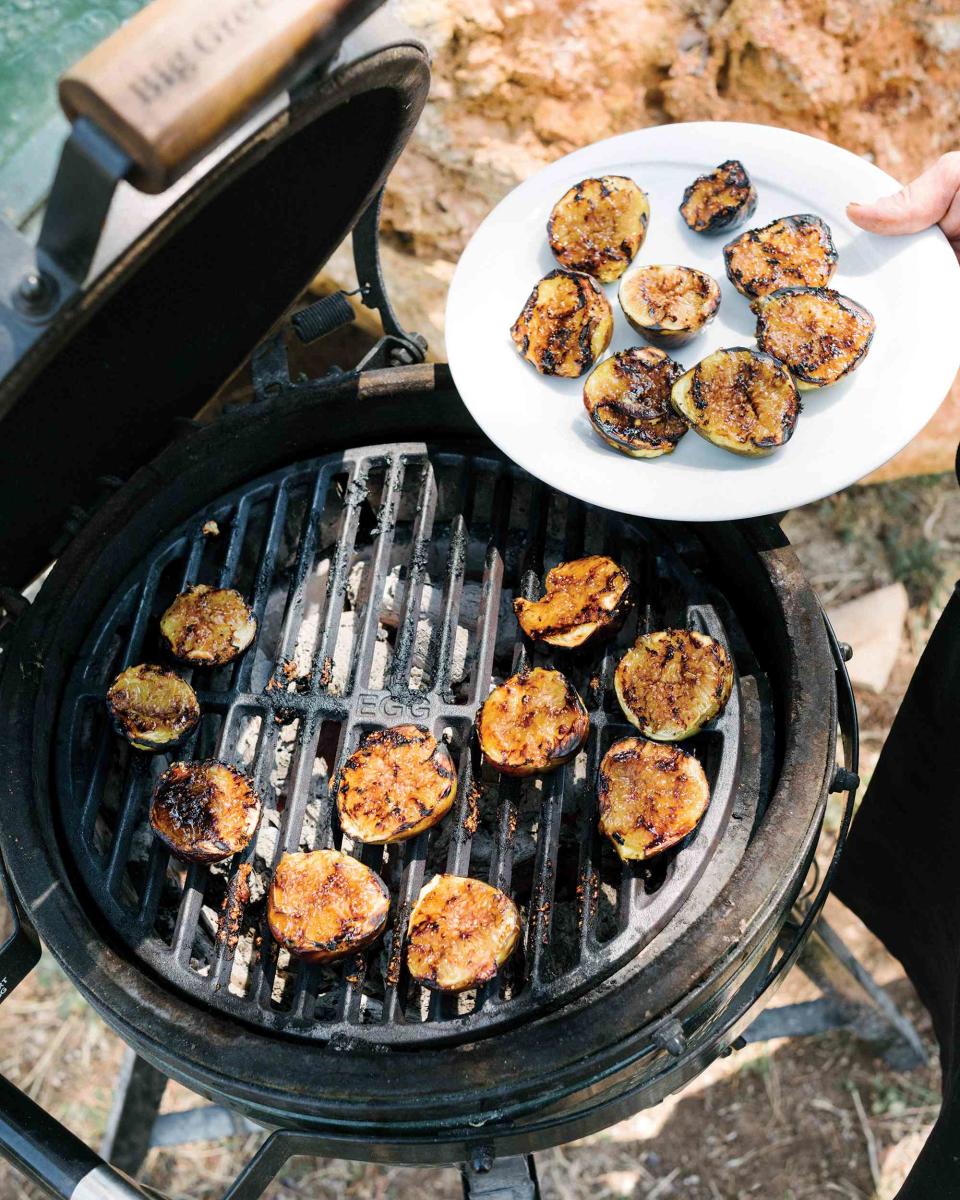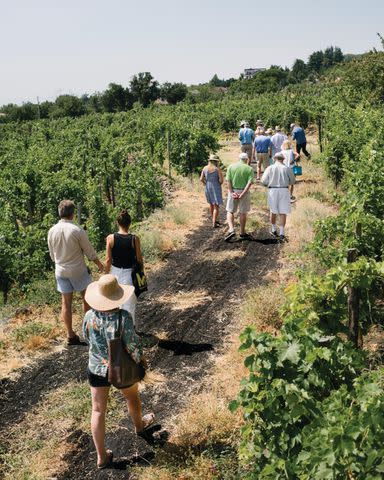This Cruise Around Italy Offers Guests Hands-On Experience Making Some of the Country's Best Dishes
Silversea delivers the most extra food excursions accessible by ship.

Prieure Lichine
At Pepe in Grani in the small town of Caiazzo, 45 minutes from Naples, Franco Pepe and his team knead about 550 pounds of dough by hand to make 700 pizzas a day, six days a week. Pepe is Italy’s most revered pizzaiolo, and his restaurant draws visitors from all over the world. They line up for an hour or more for soft-yet-chewy-yet-crisp rounds of blistered sourdough achieved through his customized approach to fermentation. Pepe is known for his clever, cheffy approach to pizza, which plays with flavors and textures, and for his ability to turn a seemingly basic staple into an art form.
The restaurant is not open for lunch, so it’s a rare treat indeed to find myself at Pepe’s counter for a noontime pizza. I’m one of just eight lucky people partaking in an intimate salon he hosts a handful of times a year inside Authentica, a private space on the top floor of the restaurant.

Prieure Lichine
“Today, I’m showing you something simple and at the same time incredibly complex,” Pepe explains to our small group. He spends the next two hours turning out pizzas in different styles, starting with a light, airy deep-fried version topped with fresh tomato, anchovy, and lemon zest — a taste, he says, of “Italian summers by the sea.” It’s followed by his signature Margherita Sbagliata, an interplay of hot dough and molten buffalo mozzarella topped with a contrast of cold tomato passata and basil–olive oil pesto to accentuate the richness of the cheese, as well as my favorite pizza: a pie topped with a cream of caramelized onion and scattered with crispy chickpeas, fried onion, and fresh, wild chicory, a satisfying symphony of sweetness, crunch, and bitterness.
It’s an incredible demonstration in pizza making, enhanced by the fact that, hours before, my seven companions and I had been at Il Casolare, the dairy that makes a custom buffalo mozzarella for Pepe in Grani. (You might have seen it in Stanley Tucci’s Searching for Italy.) Its gregarious owner, Mimmo La Vecchia, had taken us on a private tour, showing us how the mozzarella curds were separated from the whey, melted in a hot water bath, shaped, and brined. We tried the fresh, chewy, milky mozzarella before digging a spoon into a container of still-warm ricotta made from the whey — a creamy spoonful of sunshine I have not been able to stop thinking about since. Having the mozzarella on Pepe’s pizzas later that day underscored a true taste of place. (In fact, all the restaurant’s ingredients, from the tomatoes and the chickpeas to the onions, come from the surrounding valley.)
:7 Things I Learned on My First Cruise Ship
This bespoke experience is made possible by Silversea’s culinary program, S.A.L.T. (an acronym for Sea And Land Taste), directed by Adam Sachs, a food and travel writer and former magazine editor who leverages the relationships gained with food and wine pros over his many years in media to curate intimate and exclusive excursions for groups of eight to 12 guests. S.A.L.T. is offered on two of Silversea’s ships, Silver Dawn and Silver Moon, along with an interactive cooking school known as the Lab and a bar and kitchen with a daily-changing menu that showcases regional tastes reflecting each ship’s itinerary.
Sachs engages former Food & Wine Italia editor in chief, cookbook author, and bread expert Laura Lazzaroni to curate the shore excursions in her native Italy, where I’ve joined a few hundred guests on board the Dawn, sailing around the heel of Italy from Bari to Rome in just over a week. During that time, I sign up for five S.A.L.T. excursions, and the days that follow are a blur of stunning landscapes and vibrant tastes. On the scrubby plains of the Murge plateau in Puglia, I forage for wild cardoon thistles, blackberries, almonds, savory, and mint on an outing led by the charismatic 76-year-old mustachioed “Ciccillo” (a nickname for Francesco), who has been foraging here since he was 9 years old. I inhale the nutmeg-like scent of wild carrot flowers and eat both fresh and bitter almonds straight from a tree. Lunch is at the nearby Agriturismo Tenuta Tedone Consolini and is cooked by chef brothers Francesco and Vincenzo Montaruli, who use Ciccillo’s finds on the menu of their vegetarian restaurant Mezza Pagnotta inside the charming Villa Fenicia in the hills behind Bari. Vincenzo gently braises the cardoon thistles with onion in a clay dish on a Big Green Egg before tossing them quickly with egg yolks for a delicious riff on carbonara: cardoon-ara! Sitting in the shade, eating the meaty cardoons and sipping fresh elderflower lemonade, I admire how a seemingly barren landscape could yield so much life and flavor.

Prieure Lichine
In Sicily, we’re hosted by Benjamin North Spencer, author of The New Wines of Mount Etna, who takes us through the crunchy black volcanic soil of a vineyard under the shadow of Mount Etna, owned by the Benanti family, who has been making wine in Sicily since 1734. After tasting a minerally Carricante in a breezy stone gazebo overlooking the ocean, we repair to the Benantis’ ridiculously gorgeous 19th-century estate for a lunch of donkey mortadella, antipasti, and pasta in a room decorated with imposing oil paintings, candelabras, and an antique palmento winepress based on the designs of Pliny the Elder.
In Palermo, we stroll through the Mercato di Ballarò marveling at enormous cucuzza (similar to zucchini) and spirited vendors playing European techno to draw attention to their grilled stigghiole (sheep’s intestine wrapped around a scallion and grilled over hot coals), before driving out to the wine estate of Sallier de La Tour. The charismatic Costanza Chirivino, who manages the estate (and whose family has been making wine for eight generations), cooks us lunch, including artisanal pasta by Feudo Mondello—whose owners, Nina and Alberto Agosta, join us. The Agostas grow and mill their own wheat to create the most flavorful, textural pasta; it’s so good, French chef Alain Ducasse had his secretary ring the Agostas for a tour of their farm last October. Nina says she told the secretary: “I don’t know; I’m very busy,” a mischievous twinkle in her eye as she recalls the conversation.
:
In Sorrento, our final stop, we pick eggplant, tomatoes, zucchini, and squash blossoms in the organic garden of chef Peppe Guida (the “pasta whisperer,” according to Lazzaroni) in his villa overlooking Vesuvius and the Sorrentine Peninsula. Sipping on savory limoncello spritzes, we gather in the kitchen for a couple hours of instruction, making squash-blossom fritters, peppers stuffed with mozzarella and tomato, eggplant Parmesan, and a bomba layered with fried eggplant, dark chocolate cream, and sweetened ricotta. On the veranda overlooking the peninsula, we eat everything we cooked and then some, including Guida’s signature spaghettino with lemon-infused water, Provolone del Monaco, and dried lemon leaves.
And just when I think the setting, the food, and the view can’t be any more magical, there’s a chance meeting with Guida’s mother, Rosa, in her “office” out back, peeling eggplant to preserve in oil. “No one is usually allowed back here,” says Guida. “She’s going to give me hell later,” he adds with a chuckle. The moment beautifully reinforces the other joyful aspect of this trip built around food: the people we’ve met along the way. Because the simple act of sharing their philosophy, hospitality, knowledge, and passion is ultimately what gave the trip its richness and complexity, much like one of Franco Pepe’s pizzas.
Silversea’s S.A.L.T. excursions from $149, silversea.com

